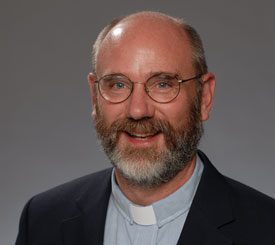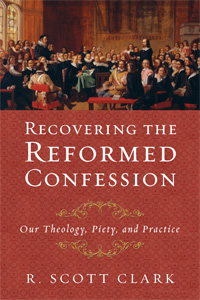This episode of the Heidelcast, from January, 2010, takes a look at Chicago radio legend Steve Dahl’s reaction to being forced to go to church for Christmas. It’s useful to hear how silly Christians appear to unbelievers when we try to be . . . Continue reading →
American Christianity
The Leithart Verdict Is In: The News is Not Good for Orthodoxy
Peter Leithart is a teaching elder (TE) in the Presbyterian Church in America. Until recently he was a minister, laboring outside the bounds of his presbytery, in a Communion of Reformed Evangelical Churches (CREC) congregation in Moscow, ID. The CREC is the . . . Continue reading →
Is the Reformed Faith Just an “Accent”?
HB reader Joseph Grigoletti pointed me to an interesting article on the website of the Christian Reformed Church in North America that seeks to explain to visitors what it means to be Reformed. The article says, in part: Reformed Christians are a . . . Continue reading →
Berger: The New American Secularism Is In Defense Of The Sexual Revolution
Let me venture a sociological hypothesis here: The new American secularism is in defense of the sexual revolution. Since the 1960s there has indeed been a sexual revolution in America. It has been very successful in changing the mores and the law. . . . Continue reading →
What Reformed Confessionalists Can Learn From Orthodox Jews
Sports themes continue on the HB. The Blaze carries a story today about an Orthodox Jewish day school in Houston, TX. Last year they earned national attention when they were nearly disqualified from participating in the state basketball tournament because they refused . . . Continue reading →
A New Program for Hired Hands
In the fundamentalist-modernist controversy in the early part of the 20th century, one of the more difficult aspects was the question of whether the “modernists” really believed the faith any longer. The suspicion among conservatives was that in some, perhaps many cases, . . . Continue reading →
And the #1 Reason for a Pastor Not to Appear on TV: “Because I’m Justin Bieber’s Pastor”
Lamenting Decline or Questioning Premises and Methods
It started with John Frame’s “Warrior Children” piece in 2003. In June, 2012 Anthony Bradley wondered about the decline of popular presbyterians. More recently Bill Evans has elaborated on theme of the decline of conservative presbyterianism. This morning I wake to find . . . Continue reading →
Garry Wills Talks Priesthood, Transubstantiation, and Hebrews
(HT: Jordan Huff). It’s not often that one sees discussion of transubstantiation on Comedy Central or anywhere else for that matter (except perhaps EWTN). It’s interesting that Wills, a Roman Catholic, seems to feel no reluctance to attack Romanist dogma. It reminds . . . Continue reading →
Dever on the Problem with Buildings, Bodies, and Budgets
(HT: Rich Barcellos)
Dr Benjamin Carson’s Address to the Prayer Breakfast
Dr Benjamin Carson’s biography is the stuff of legend and films. Born into terrible poverty, Carson is now the Director of Pediatric Neurosurgery at Johns Hopkins Hospital and the founder of the Carson Scholars Fund. A Seventh-Day Adventist, his views on creation . . . Continue reading →
Ross Douthat On The Virtues Of Confessionalism
For evangelicals, it means thinking more seriously about ecclesiology and what it will take to sustain Christianity across generations. Promise Keepers, Campus Crusade for Christ, and other parachurch groups have been important to evangelicalism. But “parachurch” makes sense over the long term . . . Continue reading →
Armstrong, Absolution, and Oprah
UPDATED 14 January 2013 (see below) 9 January 2013 Sometimes the most interesting words show up in pop culture. A faithful HB correspondent (whom I won’t name for his sake) sent me a link to a story claiming that cyclist Lance Armstrong . . . Continue reading →
To Split or Stay?
When Is It Right to Leave?
Almost from the moment I came into contact with the PCA, in 1984, people were talking about whether the PCA should split. So it’s not entirely surprising that informal talk of splitting the PCA should still exist. Nevertheless, it was a little . . . Continue reading →
HB Classic: Holograms, Gnosticism, Celebrity, and Mission
[Originally published March 6, 2010] In view of a recent post by Carl Trueman concerning virtual preachers now seems a good time to republish this HB classic. § Two jarring facts came to my attention in recent days. The first of these is . . . Continue reading →
Protestants Looking For Authority Convert to Rome
As part of trend, which has been observed here since October 2009, a retired Episcopal minister, Larry Gipson, has become a Roman priest. Gipson was formerly the rector of the USA’s largest Episcopal church. He’s in process of becoming a Roman priest . . . Continue reading →
America is Exceptional
In the previous post I tried to give some context to the claim that the USA is a “Christian” nation. There are ways in which that adjective is accurate and important ways in which it is not. Sometimes, however, when folk call . . . Continue reading →
The Myth of “Christian America”
Every four years (and in the interim) the question of whether we should regard the USA as a “Christian” nation re-emerges. There are three ways in which this question might be considered, sociologically, historically, and biblically-theologically. Under each rubric the case for . . . Continue reading →
Straining at Hermeneutical Gnats and Swallowing Exegetical Camels
Kathy Keller has reviewed the new book by Rachel Held Evans, A Year of Biblical Womanhood. Held Evans is frustrated with evangelical “complementarianism” so she set out to live as if there were no New Testament and as if Jesus’ hadn’t fulfilled . . . Continue reading →
Sister Aimee Lives!
Cal Thomas has a column in the October 12 issue of WORLD magazine on one of the more important figures in the history modern American Christianity, Sister Aimee Semple McPherson. Thomas writes, Aimee was more famous than any TV evangelist today. She . . . Continue reading →
















